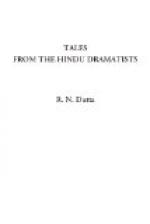MRIGANKALEKHA.
Mrigankalekha is the daughter of the king of Kamarupa or Assam: she is beheld by Karpuratilaka, the king of Kalinga, whilst hunting, and the parties are mutually enamoured.
The obstacle to their union is the love of Sankhapala, a demon, to oppose whose supernatural powers, Ratnachura, the minister of the king of Kalinga, who alone is aware of the circumstance, invites to the palace a benevolent magician, Siddhayogini, and Mrigankalekha is also lodged in the palace as the friend of the queen Vilasavati.
Notwithstanding these precautions, she is carried off by Sankhapala to the temple of Kali, which is surrounded by goblins. During the Raja’s peregrinations in his love-frenzy, he passes disconsolate through a wood in which he inquires of different animals if they have seen his mistress.
He now comes to the temple, rescues her, and kills Sankhapala. He is then united to Mrigankalekha in the presence of her father and brother, and with the consent of the queen. Before the conclusion of the marriage rite, he kills also the brother of Sankhapala, who comes to revenge him in the form of a wild elephant.
The marriage is thus effected through the secret contrivance of the minister, because the lady’s husband is to become the master of the world.
MUDRARAKSHASA
OR
RAKSHASA (THE MINISTER) WITH THE SIGNET
OR
RAKSHASA AND THE SIGNET-RING
OR
RAKSHASA KNOWN BY THE SIGNET-RING.
The city of Pataliputra or Palibothra, the capital of the Nandas, was situated not far from the confluence of the Ganges and the Sone; and was on the southern side of the rivers. Nanda, the last king of the Nanda line, had for his minister the able and experienced Rakshasa. Chandragupta also called Vrishala and Maurya is identical with Sandrakottus represented by the Greek writers as the most powerful Raja in India at the time of Alexander the Great’s death. He was a sovereign of dignity and strength of character and had a high respect for his minister Chanakya, the Indian Macchiavelli, who was a crafty, clearheaded, self-confident, intriguing and hard politician, with the ultimate end of his ambition thoroughly well-determined and directing all his clearheadedness and intrigue to the accomplishment of that end. This minister, also called Vishnugupta, is famous as a writer on Nity or “rules of government and polity”, and the reputed author of numerous moral and political precepts commonly current in India. Nanda is slain by the contrivances of this wily Brahman, who thus assists Chandragupta to the throne, and becomes his minister. Rakshasa refuses to recognise the usurper and endeavours to be avenged on him for the ruin of his late master.




